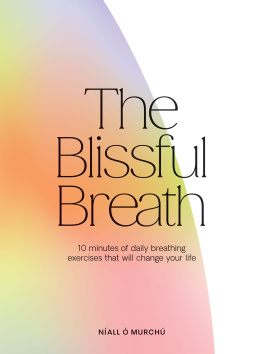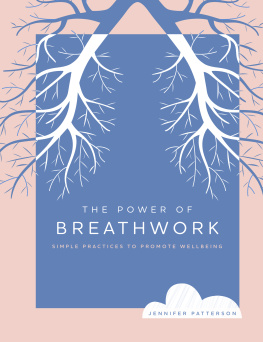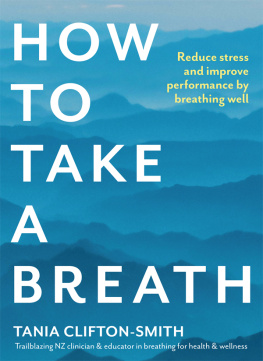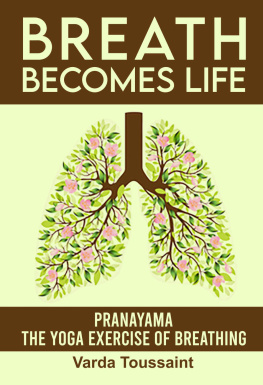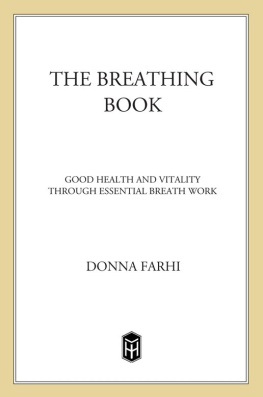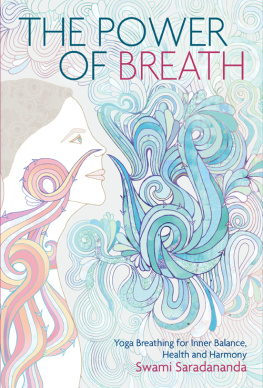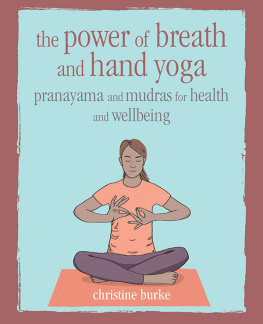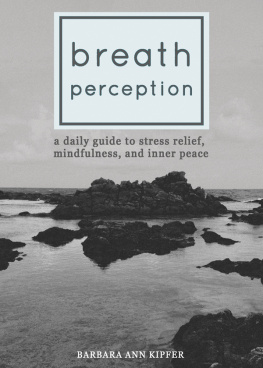
DEDICATION
To Josie, my companion.
If you want to conquer the anxiety of life,
live in the moment, live in the breath.
DR AMIT RAY
AUTHOR AND PHILOSOPHER

The power of learning how to breathe with focus and intent means we can deal with stress, anxiety and fear simply, quickly and effectively.
We can find calm and control in chaos.
We can find peace and clarity despite unrelenting pressure.
We can find deep and profound experiences in the mundane.
It wasnt always like this for me, though. I suffer from asthma and I struggled and wheezed for decades.
Then my breath became my constant companion. I studied it.
Eventually, it transformed me. It made me more open and loving. It helped me to be myself.
I searched for masters who understood it.
I went to China, India and Sri Lanka looking for answers. I climbed up freezing mountains in the snow, wearing only shorts, trying to go deeper. I jumped into the sea at night. I sat and meditated in the forest. I entered states of altered consciousness, looking for it.
I searched. I experimented.
I found ways of breathing that helped me. I shared them with others. They found great benefits in them too. They shared them with more people.
My struggles with breathing ended. I was no longer wheezing.
Instead, I found the blissful breath.
The blissful breath is calming and comforting.
The blissful breath is vital and strong.
The blissful breath is restorative and redemptive.
The blissful breath is a force for good in our lives. It helps us. It heals us.
The blissful breath is when we breathe in a way that transforms us.
This is what I want to share with you.
When the breath moves, the mind moves.
When the breath is still, the mind is still.
HAHA YOGA PRADPIK
A TRANSLATION AND ANALYSIS OF A 15TH-CENTURY SANSKRIT YOGIC
TEXT BY SWAMI MUKTIBODHANANDA

MY JOURNEY WITH THE BREATH
The focus on long, calming exhalations is present in many cultures. I first came across this under the watchful eye of Shifu Shi Yanzi, a world combat champion and Buddhist monk. He had been sent by the abbot of the world-famous Shaolin Temple in China to set up a temple in London. I spent many nights training outside in the rain and cold, learning how to fight. We would sprint, jump and crawl up and down a long cement ramp for hours. My muscles burned, and my lungs felt as if they were going to explode.
But then, Shifu Yanzi told us to stop and take a moment to focus on our breathing. We took deep breaths in and exhaled all the way out. Again and again. We accompanied the breathing with arm movements, reaching up and out. It helped us to grab hold of our erratic breathing and slow it down. The effect was nearly immediate: I started to feel settled and recovered; I was ready to go again, despite the cold rain and the dreaded ramp.
This was a revelation. It was the first time I had been shown that I could control how I felt by controlling my breath. I was shocked. I had been an international athlete for years, playing basketball for Ireland, but there was no attention given to our breathing and its effect on us.
Fast-forward 10 years, back in Dublin, and as I twist my body into an uncomfortable yoga position, Im trying to stay focused on my breath. I attempt to breathe in, despite the fact my arm is wrapped around my back and Im leaning forward over my outstretched leg. To help my mind focus on my elusive exhale, Im encouraged to emphasise the sound the breath makes as it passes through my throat. This is known as ujjayi breath and has been used in yoga for a very long time to calm the nervous system.
Again, the effect is almost immediate. I begin to feel comfortable in the discomfort despite the sweat rolling down my back.
Jump forward another 10 years and I am in a frozen river in the mountains of Poland in the throes of winter. Im in swimming shorts, neck-deep in bone-crunchingly cold water. Im here as part of my training to become a Wim Hof Method instructor. I am learning how to regulate my breathing, so that I can control how I feel and think in spite of the incredibly harsh conditions.
Again, the effects of focusing on my exhale are almost immediate: the pain and shock recedes into the background; it is just me and my breath.
My journey from one discipline to the next may seem haphazard and disconnected. But there was a thread tying it all together: the breath. Specifically, if we can learn to focus on our exhale, despite the discomfort, then we can find a way to feel safe, comfortable and calm again.
YOUR JOURNEY WITH THE BREATH
How much time do you spend every day thinking about breathing?
If we stopped breathing, wed be dead in minutes. Not in weeks and days, as with food and water, but in minutes. We could argue that breathing is the most important thing in our lives. Without it, our lives would be over very quickly.
Lets take a moment to experience this in a small way. As you read this, take a deep breath in and breathe out. Go on. Breathe in deeply and then exhale, and at the end of your exhale hold your breath. So, you have exhaled, and you are now holding your breath.
Watch what happens.
As you read this now, youll probably feel fine as you hold your breath. But youll start to feel a pressure build inside as you continue to hold it. Youll begin to feel a change in your body. Its beginning to adjust to the reality that you have stopped breathing. As you read this, and continue to hold your breath, you might begin to feel more pressure building in you. You might feel your throat tightening and pulsing as if youre trying to swallow.
How does it feel as the pressure builds? It might be a little unpleasant. If you can, keep holding. Our bodies have many tricks and triggers to force us to pay attention to the danger of not breathing. Youre probably feeling some of them now.
When you feel a strong urge to breathe, take a deep and restorative breath in. Youll probably feel a sense of relief. Youll probably feel delighted to take that breath. Your body will certainly thank you.
It is such a relief to take that breath in.
That is just a glimpse into the incredible importance of breathing and our hunger for it. Within a minute or two of holding our breath, our entire body and mind are doing everything they can to get us started again. Our breathing is the beginning and end of our existence.
Obviously, we breathe a lot without thinking about it. About 20,000 times a day, in fact. Our autonomic nervous system breathes for us we dont have to remember to do it. It just happens. We are built in a way that allows us to ignore our breathing completely if we want to. Most of us do.
Someone pushes us out of the way on the train and our breathing becomes erratic, reflecting our sense of shock and anger. When that unwanted email lands in our inbox, we open it fearfully and hold our breath as we read the bad news. We watch the sunrise over the sea and our breathing slows down, reflecting the openness and safety we feel. We hug someone we love, breathing in softly and dissolving into their arms as we breathe out.
Our breathing is our constant companion. It is with us through every experience: the good, the bad and the ugly. It is the one of the first things we do when we are born and one of the last when we die. It is always there with us.
Next page
